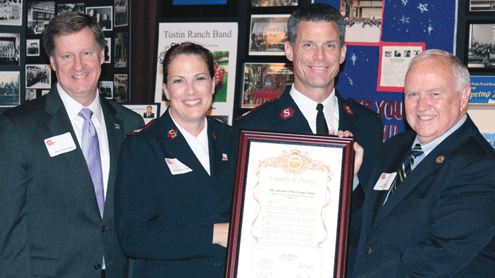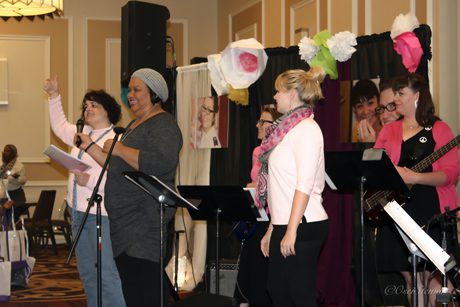Listen to this article
Listen to this article
Loading
Play
Pause
Options
0:00
-:--
1x
Playback Speed- 0.5
- 0.6
- 0.7
- 0.8
- 0.9
- 1
- 1.1
- 1.2
- 1.3
- 1.5
- 2
Audio Language
- English
- French
- German
- Italian
- Spanish
Open text
“his love is worth it all!”. by frances dingman –. staff captain nellie truelove, who wore a policeman’s tin star, was credited with saving over 300 women in los angeles around the turn of the century. born in london in 1863, she became interested in the salvation army’s principles and methods, defying her family to enter the training school. she gave rescue work for fallen women her best efforts both in london and glasgow. looking upon the hardness of the life as an opportunity, she felt her time there was her special training ground. once when a drunk and troublesome woman had been ejected from her rooming house and was fighting with another woman. nellie immediately put herself between them, saying, “now, i’m for both of you, so if you want to fight, you can fight me!” finally she brought the two women to the meeting, sitting between them to keep the peace. her explanation of the affair afterwards was, “well, if the salvation army doesn’t do something to get this sort of people to heaven, who will?”. when further orders took her to cleveland, ohio, nellie left behind an impressive record of service. there wasn’t one of cleveland’s 12 churches in which she was not welcome to make an appeal for her work. in 1898, officers were needed to run the new los angeles rescue home at 23670 griffin ave, and nellie was sent to establish it. so many women came and went through the doors that it was difficult to keep count of how many lives has been turned around. plagued by ill health, she stayed at her post and maintained a beautiful influence on her girls. often she spent days and nights in the haunts of sin and suffering in trying to ease the bruised hearts of the degraded, for whom she always felt there was hope. putting her loving arms around these fallen girls with an affection that they could not doubt was genuine, this worker in the lord’s vineyard won hundreds for the master. in 1903, she was granted the right to wear a tin star as the first woman police officer in los angeles, and possibly the whole country. her authority, exercised only in her duties at the home, enabled her to keep her in touch with the police in her rescue work. not until seven years later was another woman commissioned as a regular police officer. early in 1904, after a serious operation, she weakened and was promoted to glory. among her last words were “take care of my girls,” and “it was worth it all!”. the streets were lined with thousands of people as eight policemen led a white hearse drawn by four white horses. everyone said they had never seen the city so stirred to the heart–and by one quiet woman. as it passed the red light district, the saloon keepers and bartenders stood outside with doors closed and heads bared, out of respect. for five years she had worked in los angeles, and her loving heart was always full of the deepest sympathy for the outcast and the injured, the downtrodden and the helpless. nellie had spent much effort raising funds to build a second rescue home. after her death the los angeles times article describing her work so touched the public that funds were raised to complete the building that would bear her name.
Open context player
Close context player
Plays:-Audio plays count
“his love is worth it all!”. by frances dingman –. staff captain nellie truelove, who wore a policeman’s tin star, was credited with saving over 300 women in los angeles around the turn of the century. born in london in 1863, she became interested in the salvation army’s principles and methods, defying her family to enter the training school. she gave rescue work for fallen women her best efforts both in london and glasgow. looking upon the hardness of the life as an opportunity, she felt her time there was her special training ground. once when a drunk and troublesome woman had been ejected from her rooming house and was fighting with another woman. nellie immediately put herself between them, saying, “now, i’m for both of you, so if you want to fight, you can fight me!” finally she brought the two women to the meeting, sitting between them to keep the peace. her explanation of the affair afterwards was, “well, if the salvation army doesn’t do something to get this sort of people to heaven, who will?”. when further orders took her to cleveland, ohio, nellie left behind an impressive record of service. there wasn’t one of cleveland’s 12 churches in which she was not welcome to make an appeal for her work. in 1898, officers were needed to run the new los angeles rescue home at 23670 griffin ave, and nellie was sent to establish it. so many women came and went through the doors that it was difficult to keep count of how many lives has been turned around. plagued by ill health, she stayed at her post and maintained a beautiful influence on her girls. often she spent days and nights in the haunts of sin and suffering in trying to ease the bruised hearts of the degraded, for whom she always felt there was hope. putting her loving arms around these fallen girls with an affection that they could not doubt was genuine, this worker in the lord’s vineyard won hundreds for the master. in 1903, she was granted the right to wear a tin star as the first woman police officer in los angeles, and possibly the whole country. her authority, exercised only in her duties at the home, enabled her to keep her in touch with the police in her rescue work. not until seven years later was another woman commissioned as a regular police officer. early in 1904, after a serious operation, she weakened and was promoted to glory. among her last words were “take care of my girls,” and “it was worth it all!”. the streets were lined with thousands of people as eight policemen led a white hearse drawn by four white horses. everyone said they had never seen the city so stirred to the heart–and by one quiet woman. as it passed the red light district, the saloon keepers and bartenders stood outside with doors closed and heads bared, out of respect. for five years she had worked in los angeles, and her loving heart was always full of the deepest sympathy for the outcast and the injured, the downtrodden and the helpless. nellie had spent much effort raising funds to build a second rescue home. after her death the los angeles times article describing her work so touched the public that funds were raised to complete the building that would bear her name.
Listen to this article














